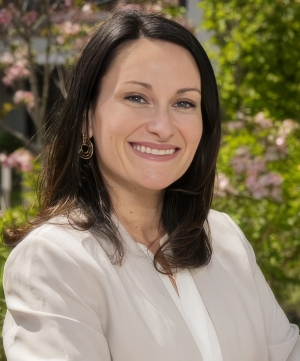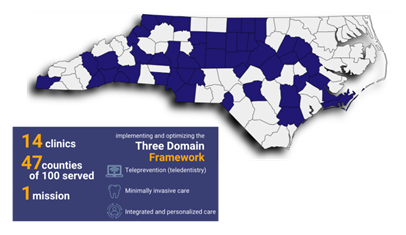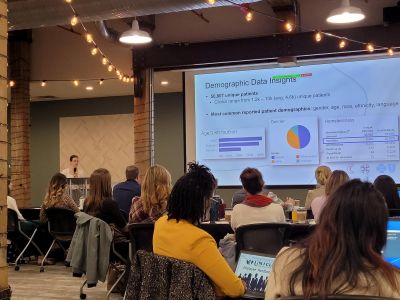Enter your email to receive the CareQuest newsletter:
August 1, 2025
By Danielle Apostolon, Value-Based Care Program Manager, and Christine Kanan, Implementation Health Transformation Senior Manager, at CareQuest Institute
CareQuest Institute is working to transform the oral health system of the future into one that is accessible, equitable, and integrated — but none of that work would be possible without our Community Health Center (CHC) partners.

Today, and this National Health Center Week, we are showing our appreciation (and sharing a helpful resource) for CHCs, nonprofit organizations that provide comprehensive, affordable primary and preventive care, including oral health services, to underserved communities. In 2023 alone, CHCs served more than 31 million patients across the US. And every day, they change countless individual lives.

“CHCs play an integral role in our health care system,” says Leslie Carver, Executive Vice President and Chief Operating Officer at CareQuest Institute. “For 60 years, health centers have been delivering neighborhood-based care tailored to the unique cultural, social, and health needs of the diverse communities they serve, both urban and rural.”
One project we’re particularly proud of — a project our team worked on for more than two years — highlights that work and those lives in North Carolina.
The Cornerstones of Health Equity

As of 2024, 93 of 100 counties in North Carolina are dental health provider shortage areas, making access to oral health care difficult in those regions. Oral health leaders, including North Carolina Oral Health Collaborative and Blue Cross Blue Shield of North Carolina Foundation, recognized that CHCs across the state were uniquely positioned to improve health equity. The CHC model of care’s emphasis on access and affordability is critical to close care gaps for high-needs populations across the state.
The Community Oral Health Transformation Initiative (COrHT) provided the opportunity for CHC dental programs in North Carolina to create meaningful change for the patients they serve. The initiative, developed by CareQuest Institute, provided a framework for safety net dental clinics to implement medical-dental integration and value-based oral health care.
A Coordinated Approach to Transformation
Before starting the initiative, stakeholders, including CareQuest Institute, North Carolina Oral Health Collaborative, and Blue Cross Blue Shield Foundation of North Carolina, conducted a comprehensive assessment to develop program goals. The assessment included:
- Data collection and environmental scanning: Using public data sources allowed stakeholders to understand the external factors influencing oral health across the state, including policy, infrastructure, and workforce.
- Expert insights: Stakeholders surveyed and interviewed state experts to provide additional context and experience with the status of oral health care in the state, identify opportunities, and understand perceived barriers.
With this data in hand, the initiative brought together an approach to transformation that was coordinated, shaped by evidence, rooted in community voice, and supported by feedback. The data showed:

- Development of a common goal: Based on the findings of the assessment, initiative stakeholders identified technology, minimally invasive care, personalized and interprofessional care, alternative payment, and policy change as priority areas of focus for participating CHCs.
- A road map for action: The assessment provided a foundation for program participant strategic and action planning. Despite their common goals, each CHC took a different approach to create sustainable, community-driven solutions. Some focused on building their school-based programs, launching local outreach campaigns, or streamlining preventive care.
Small Changes Led to Meaningful Results
Program participants didn’t need to wait on a massive shift in oral health policy to make changes. They had the power to enhance care practices for their patients now. The COrHT Initiative provided them with the support, tools, and data to better understand their state and local communities. They also had a care team that was not afraid to make changes and maintained a commitment to provide quality oral health care.
One participant summarized the importance of a community-focused approach to health transformation: “We encourage staff to think beyond teeth,” they said. “Mental health, general health, and social disparities are just as important as dental health.”
COrHT teams were able to align clinical care with data-driven decision-making and address operational inefficiencies such as scheduling, hygiene workflows, and reimbursement. This led to enhancing access to care through teledentistry, extending care into the community, streamlining preventive care, and focusing on what the patient needs.
With the help of COrHT, one participant, Blue Ridge Health, integrated its elementary school-based mobile dental services. Blue Ridge Health was able to provide at-risk school children with preventive care and identify children who required more intensive care.
Another participant, Carolina Family Health Centers, focused on improving access and availability of care to special populations. By the end of the initiative, they exceeded their previous year’s totals for Ryan White and methadone addiction treatment visits.
The report, “The Collaborative Effect Transforming Oral Health in North Carolina,” offers additional details of how the initiative’s framework allowed CHCs to make sustainable improvements.
Ready to Try It Yourself?
Aligning with our celebration of National Health Center Week, CareQuest Institute recently published a Community Oral Health Needs Assessment. A community health needs assessment is a way of using readily available information to plan health care and public health programs in the future. It also helps existing programs better understand the environment that they are working in and identify potential partners to help meet oral health needs in the community. The assessment:
- Describes the populations residing in the service area
- Helps identify barriers to oral health, major risk factors, and causes of poor health
- Helps identify actions needed to address the variables in the previous bullet
Federally Qualified Health Centers (FQHCs) can also use this assessment, as the Health and Resources Services Administration expects FQHCs to conduct a needs assessment every three years.
Editor’s note: Thank you to the CHC teams across the country who work tirelessly to provide access to equitable, integrated, and coordinated care to millions of patients who are underserved and underinsured. To learn more how organizations can improve their patient experience of care, use data to drive decisions leading to meaningful operational changes, and improve access and continuity of care, visit www.carequest.org/health-transformation.